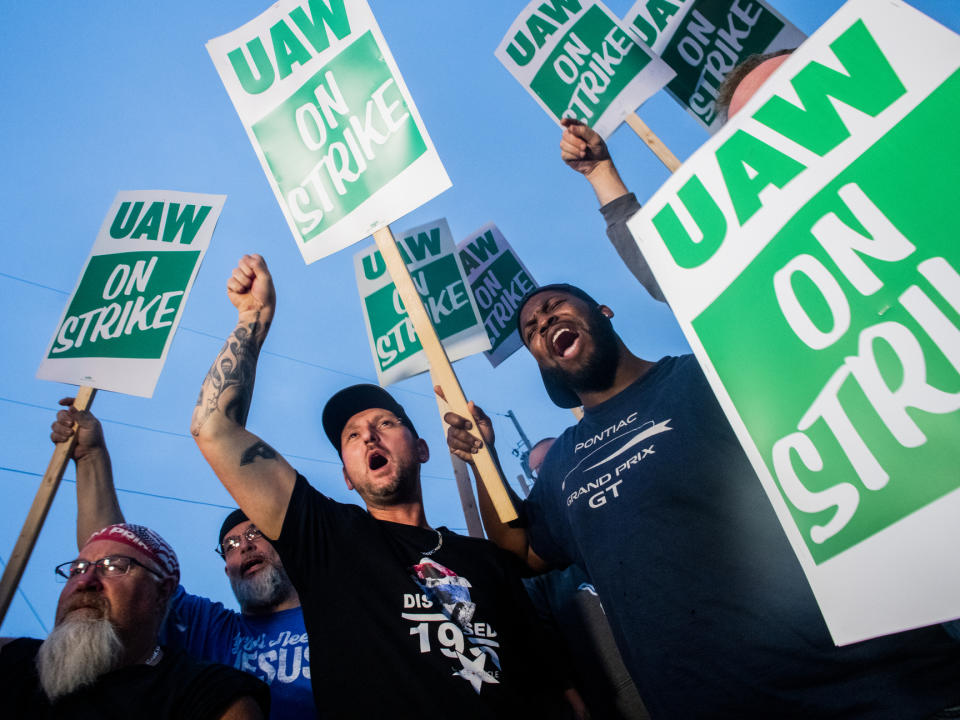The GM strike won’t revive unions
Unions are having a moment. The strike by 46,000 General Motors workers has shut down the automaker, evoking epic labor battles of America’s industrial peak.
This follows successful strikes by unionized workers in recent years at Marriott, Stop & Shop and school districts in a number of states. Presidential candidates Joe Biden, Pete Buttigieg, Amy Klobuchar and Elizabeth Warren have marched with strikers or expressed solidarity. More than 80,000 unionized health care workers could strike at Kaiser Permanente beginning in October.
But a surge in union membership is unlikely, even as public approval of unions rebounds from lows of a decade ago. In some ways unions are better in theory than in practice, and the business cycle is working against them. Here are four reasons unions are unlikely to make a comeback:
The next recession
It’s probably no coincidence unions are flexing their muscles late in an economic expansion, with very low unemployment and labor shortages in some markets. Workers have leverage when labor is scarce. And companies with profits that have been growing for years can afford to make concessions to workers.

It won’t necessarily last, however. A recession may not be imminent, but it is inevitable. Unemployment will rise at some point, and workers will lose leverage. We’ll probably have another “jobless recovery,” as we have after the last three recessions. Many companies use recessions to revamp their staffing practices and make their operations more efficient. That often means finding ways to lower labor costs.
Automation
Every worker won’t be replaced by a robot, but some will. The jobs most vulnerable to automation are those that involve repetitive, rote tasks, such as assembly-line workers, retail clerks and warehouse packers. Many vulnerable jobs overlap with those that are unionized, which will keep union membership down.

Worker choice
Some workers say they’d join a union if they could, but that’s not always what happens when they actually get the choice. Volkswagen workers in Tennessee voted earlier this year not to join the United Auto Workers union, with 52% voting against. Unions probably do help secure higher pay, but they also come with fees and rules that turn some people off. In a similar vein, some Uber and Lyft drivers oppose new legislation in California that would require the companies to treat them as employees, because they prefer the flexibility that comes with being an independent contractor.
Union abuses
Unions were less popular when they were more prominent, in part because of practices many people find off-putting. For years, the UAW had a “jobs bank” that paid excess workers for doing no work. Union rules sometimes forbid workers from doing simple tasks because it’s not in their job description. A 2017 New York Times report described how unions helped send construction costs for a New York railroad project soaring, in part because union contracts required four times as many workers as similar non-union jobs. Even now, the government is investigating top UAW officials for possible corruption and embezzlement of union money.
The striking GM workers might get a good deal. The timing is right and GM should probably end noxious practices such as keeping some full-time workers in “temporary” status indefinitely, so they can be laid off more easily in a downturn. But the modern knowledge economy doesn’t go by union rules. Unions have a place, but it’s a shrinking one.
Rick Newman is the author of four books, including “Rebounders: How Winners Pivot from Setback to Success.” Follow him on Twitter: @rickjnewman. Confidential tip line: rickjnewman@yahoo.com. Encrypted communication available. Click here to get Rick’s stories by email.
Read more:
The rich should get ready for Warren’s wealth tax
Trump’s trade war has killed 300,000 job
Democrats are attacking the wrong companies
Trump’s biggest gamble yet: tax hikes before an election
Obama was better for your 401(k) than Trump has been
Read the latest financial and business news from Yahoo Finance
Follow Yahoo Finance on Twitter, Facebook, Instagram, Flipboard, SmartNews, LinkedIn, YouTube, and reddit.



